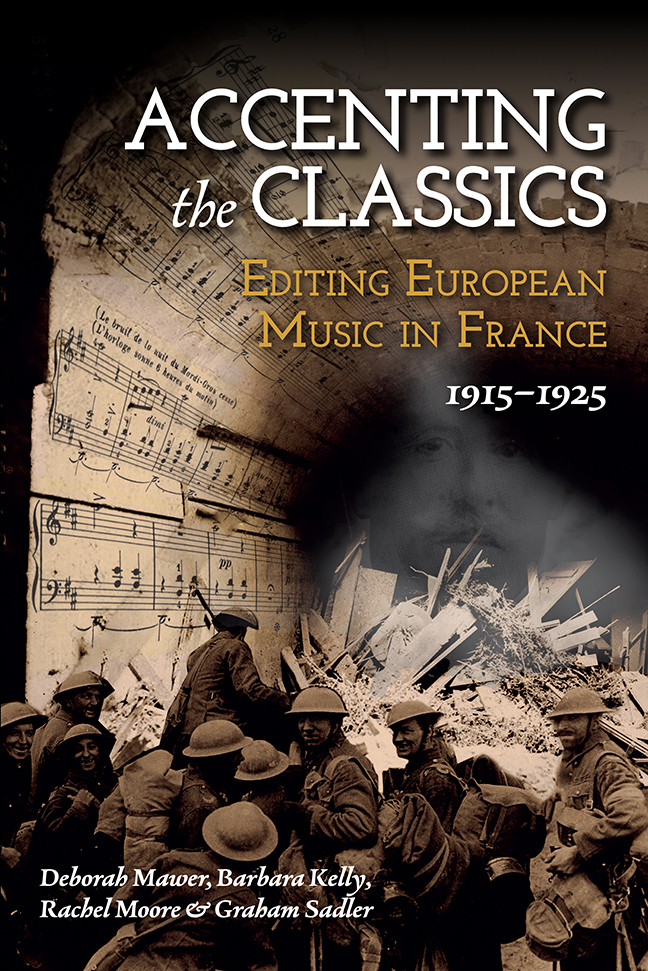Book contents
- Frontmatter
- Contents
- List of Figures
- List of Tables
- Notes on Co-authors
- Acknowledgements
- List of Abbreviations
- Note on the Text
- Introduction
- Part I Durand and His Édition Classique
- Part II Composer–Editor Case Studies
- Part III Beyond Editing: Pedagogy, Performance, Composition
- Afterword
- Select Bibliography
- Index
10 - The Édition Classique and French Neoclassicism: L’École moderne as Exemplar
Published online by Cambridge University Press: 10 January 2024
- Frontmatter
- Contents
- List of Figures
- List of Tables
- Notes on Co-authors
- Acknowledgements
- List of Abbreviations
- Note on the Text
- Introduction
- Part I Durand and His Édition Classique
- Part II Composer–Editor Case Studies
- Part III Beyond Editing: Pedagogy, Performance, Composition
- Afterword
- Select Bibliography
- Index
Summary
Across this book a variety of perspectives have been presented about ways in which French editors and their European composer subjects within the Édition Classique Durand might relate to an underpinning (neo)classicism – an associated objective within the main aims identified in the Introduction. The whole notion of embracing a large treasure trove of classical music, from Couperin and Bach through Mozart, Beethoven and others, with a firm focus upon piano and chamber music repertory, suggests a certain fundamental congruence. Following a précis of previous discussion of the complex, sometimes contested concept of neoclassicism, in tandem with that of sortie de guerre, this chapter focuses on the modern French music anthology edited by Isidor Philipp: L’École moderne (de Bizet à Maurice Ravel).
Published in 1926 as part of the Édition Classique, the nature and musical contents of this large-scale post-war collection serve in turn to challenge some commonly accepted tenets of neoclassicism. In part, the scope for a rethink here emerges from the broad internal compositional span of L’École moderne which covers the years 1870–1925; this extended date-span of the anthology also enables it to function as one suitable endpoint for the Accenting the Classics study. Crucially, this collection marks the point at which original ‘modern’ compositions by several of the Édition's main editors, including Saint-Saëns, Fauré, Debussy, Dukas and Ravel, are showcased within the Édition Classique itself. In other words, it symbolises where editors who were, prior to the outbreak of war, primarily composers are once more recognised as composers within the pages of the Édition. Other associated concepts treated earlier in the book remain relevant here, especially those of modernism, wartime, French national identity, European and international relations, together with canonicity.
A ‘Repackaging [of] the Old Masters’ was posited (Chapter 7), as well as an editorial–compositional trajectory in engaging with Bach (Chapter 6), as it related to Fauré, Maurice Emmanuel and Jean Roger-Ducasse. As evidenced in Chapter 2, at least a dozen editors – whether composers, musicologists and/or performers – were involved with the oeuvre of Bach, many more than for any other composer from the eighteenth- or nineteenth-century past. Further chapters revealed several other French composer-editor figures for whom a neoclassical style of composition would become a relevant concern, including Albert Roussel, Guy Ropartz and Henri Büsser.
- Type
- Chapter
- Information
- Accenting the ClassicsEditing European Music in France, 1915-1925, pp. 289 - 322Publisher: Boydell & BrewerPrint publication year: 2023



